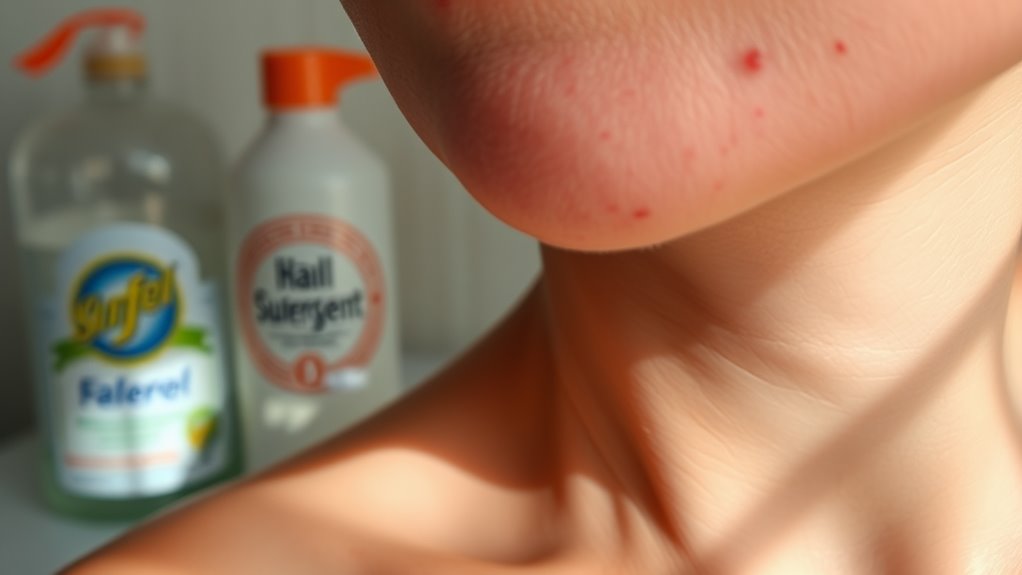Sensitive Skin. Avoid These Hidden Irritants
If you have sensitive skin, you know that seemingly harmless products can lead to irritation. Fragrances in lotions and perfumes can trigger redness, while harsh chemicals in skincare can strip your skin’s natural oils. Alcohol-based products may dehydrate, and artificial dyes could cause rashes. Even common fabrics and detergents might exacerbate your sensitivities. Understanding these hidden irritants is crucial for maintaining your skin’s health, so let’s explore what you can do to protect it.
Key Takeaways
- Avoid fragrances in products, as they can trigger skin irritation and allergic reactions in sensitive skin.
- Steer clear of harsh chemicals like sulfates, parabens, and synthetic dyes that may cause dryness and sensitivity.
- Check for alcohol-based ingredients, which can dehydrate skin and exacerbate sensitivity issues.
- Be cautious of synthetic dyes and colorants, as they can lead to allergic reactions and irritate the skin.
- Opt for natural fibers and hypoallergenic detergents to reduce irritation from fabrics and cleaning products.
Fragrance and Perfumes
Fragrance and perfumes often contain a complex mixture of chemicals that can trigger skin irritation, especially in those with sensitive skin.
Many of these compounds act as irritants for sensitive skin, leading to reactions such as redness, itching, or burning sensations.
Even products labeled as “fragrance-free” may still contain masking agents that can provoke sensitivity.
Even products marketed as “fragrance-free” can contain hidden masking agents that trigger skin sensitivity.
To minimize these risks, you should opt for products formulated specifically for sensitive skin, which often use fewer synthetic ingredients.
Always perform a patch test before applying new scents to ensure that your skin won’t react adversely to the fragrance components present. Additionally, understanding key symptoms of sensitivity can help you make informed choices about your skincare products.
Harsh Chemicals in Skincare Products
Many skincare products contain harsh chemicals that can exacerbate irritation for those with sensitive skin. Ingredients like sulfates, parabens, and synthetic dyes are common culprits.
Sulfates can strip natural oils, leading to dryness and irritation.
Parabens, used as preservatives, may cause allergic reactions in some individuals.
Synthetic dyes can trigger sensitivities, causing redness or itching.
When choosing products, always check the ingredient list for these harmful substances. Opt for formulations labeled “hypoallergenic” or “free from harsh chemicals” to minimize the risk of irritation. Additionally, consider using a cleanser that is specifically formulated for sensitive skin to help maintain your skin’s balance and prevent irritation.
Your skin deserves gentle care to maintain its health and integrity.
Alcohol-Based Ingredients
Alcohol-based ingredients are prevalent in various skincare formulations, but they can pose significant risks for individuals with sensitive skin.
These ingredients, like ethanol and isopropyl alcohol, can strip your skin of its natural moisture, leading to dryness and irritation.
Ethanol and isopropyl alcohol can dehydrate your skin, causing irritation and dryness.
They may also disrupt your skin barrier, making it more susceptible to allergens and environmental stressors.
If you have sensitive skin, it’s crucial to read ingredient labels carefully and avoid products containing high concentrations of alcohol.
Instead, opt for hydrating alternatives like glycerin or aloe vera, which provide moisture without the harsh effects associated with alcohol-based products. Additionally, using gentle skincare solutions can help maintain your skin’s health and integrity.
Artificial Dyes and Colorants
Artificial dyes and colorants are common in many skincare products, adding visual appeal but posing risks for sensitive skin.
These synthetic additives can trigger allergic reactions, resulting in redness, itching, or rashes. Many dyes, such as FD&C Blue No. 1 and Red No. 40, contain chemicals that may disrupt skin barrier function. Additionally, understanding sensitive skin is essential for selecting appropriate products that minimize irritation.
If you have sensitive skin, it’s crucial to scrutinize ingredient labels and opt for products labeled as dye-free or hypoallergenic.
Natural alternatives, like plant-based colorants, can provide similar benefits without the associated risks.
Prioritizing your skin’s health means being vigilant about what you apply. Choose wisely.
Common Allergens in Fabrics and Detergents
Common allergens in fabrics include synthetic fibers like polyester and nylon, which can trap moisture and irritate the skin. Additionally, certain detergents contain fragrances, dyes, and preservatives, all of which can trigger allergic reactions. Optical brighteners often used in laundry products may also cause irritation. When selecting fabrics and detergents, opt for natural fibers like cotton and hypoallergenic detergents labeled as free of dyes and fragrances. Always perform a patch test to identify any potential reactions before fully incorporating new products into your routine. Furthermore, the choice of pillowcase materials can also play a significant role in skin health, as certain fabrics may exacerbate irritation or contribute to acne.




